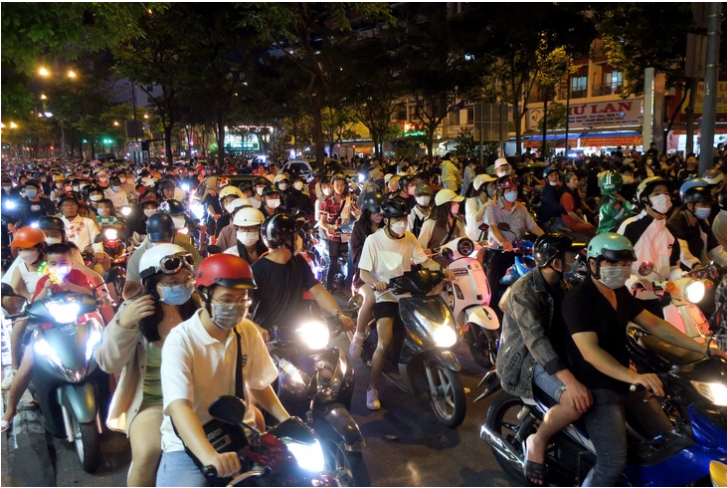Support policies for buyers of electric motorbikes and scooters should be created as encouragement for local residents to make the change from gas-powered vehicles, rather than merely offering incentives to electric car buyers and manufacturers, Dr. Ngo Tri Long, former head of the Price and Market Research Institute under the Ministry of Finance, told Tuoi Tre (Youth) newspaper.
Owners of gasoline-powered motorbikes have voiced similar opinions.
According to Long, the fact that so many Vietnamese rely on motorbikes for transport means the country has a massive volume of emissions.
Though Vietnam is planning to regulate the measurement of motorcycle emissions as part of its efforts to reduce pollution, it does not seem to have any support policies in the works to promote the use of environmentally-friendly e-bikes.
Long added that Vietnam currently has nearly 70 million gasoline-powered motorbikes and the number of motorbike users is well above the number of auto owners.
He also noted that the demand for e-motorcycles and e-scooters is sure to be high in the future, therefore preferential policies for e-motorbike buyers are vital.
Other experts have opined on why these preferential policies do not exist.
Many large cities have proposed prohibiting motorbikes in downtown areas and the number of electric car users will be higher than that of e-motorbike owners because Vietnam is discouraging motorbike usage, according to Vu Van Trung, vice-chairman and general secretary of the Vietnam Consumers Protection Association, who recently shared his thoughts on why the Ministry of Transport has only proposed incentives for electric car buyers and manufacturers.
Hoang Manh Tan, deputy general director of Son Ha Group, a local multi-industry enterprise which has ventured into the e-scooter sector, said the group saw the huge potential of the e-bike industry.
Vietnam has seen strong sales of motorbikes but most gasoline-powered motorbikes are manufactured and supplied by foreign firms.
However, Vietnamese enterprises still have opportunities to compete with foreign rivals to increase market shares in the e-motorbike and electric vehicle sectors, Tan said.
Enterprises are in need of support policies to boost the conversion to EVs from gasoline-powered vehicles, Tan noted, adding that e-motorbike and e-scooter manufacturers are at a disadvantage compared with electric auto firms.
Meanwhile, Indonesia and China have offered support policies to urge residents to shift to e-motorbikes.
N.V.T., an office worker in Hanoi, said he had to sell his gasoline-powered motorbike to buy an e-scooter to save on fuel costs amid his falling salary.
With a monthly salary of VND12-15 million (US$504-630), buying an electric car is beyond the capability of most office workers despite support policies.
Therefore, e-scooters remain a vehicle of choice, T. added.
Like us on Facebook or follow us on Twitter to get the latest news about Vietnam!






















































